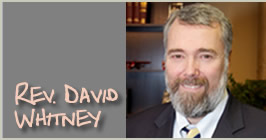By Reverend David Whitney
June 21, 2015
NewsWithViews.com
When we think about the subject of war, what usually comes to mind is the physical battles, the death and destruction wrought on the field of conflict as well as their aftermath. However, there is a warfare that is just as real, but does not engage in that level of physical violence. As disciples of Jesus Christ we are instructed that we are continually at war with the enemy of our souls, that the spiritual battle rages across the face of the earth and we are to run to the battle, to fight the good fight. Therefore it is incumbent upon us to understand the nature of this battle which we are engaged.
Video of the Serman
One of the virulent anti-Christian forces in the world during the last two centuries has been communism. Many people falsely believe it was defeated with the fall of the Berlin wall but that is not so. What took place is that the obvious militaristic branch lost. So that the danger of hot war or cold war against a regime bent on military world conquest seemed to evaporate. Nonetheless, there was a more insidious branch represented by Italian Antonio Gramsci.
“In Marxist philosophy, the expression “cultural hegemony” refers to the beliefs, explanations, perceptions, values and moral norms of a ruling class whose worldview is accepted as the cultural norm or “universally valid dominant ideology.” According to the student radicals of 1968, the ruling classes of western societies had for centuries promoted Christianity as their dominant ideology, not because it is true, but because it served their political and economic interests. Thus, in order to destroy their power, it followed that one had to undermine the so-called cultural hegemony of Christianity itself.
Different Marxist factions had different ideas about how best to go about this. The Italian Communist Antonio Gramsci drew a distinction between what he called a “war of manoeuvre” and a “war of position.” The war of manoeuvre was the Stalinist model. One simply used political violence to achieve one’s ends. But Gramsci thought this would not work in the more highly developed Western countries. For these countries, he recommended a war of position. A war of position is one in which one first identifies “switch-points of social power” and then one seeks to peacefully take control of those switch-points. The switch-points all relate to the field of cultural values – in particular, the arts and education. The most important switch-points of power are positions like school principal, university professor, government policy maker, education department bureaucrat and journalist.
In 1967, Rudi Dutschke, a German student leader, reformulated Antonio Gramsci’s philosophy of cultural hegemony with the phrase, “The long march through the institutions.” Instead of a long military march, such as the one undertaken by the Chinese Marxist Maoist Tse-Tung, in the highly developed western countries the long march would be through the most culturally significant of our social institutions – that is, through schools, universities, courts, parliaments and through the media, through newspapers and television.”[1]
One of the most powerful weapons the anti-Christians invented was to take control of and ultimately change the language used by the people being conquered. You have probably heard about the movement dubbed Political Correct speech. Allan Bloom reported on it in The Closing of the American Mind.
You may have heard of the outrageous applications of this, especially on college campuses where free speech is outlawed except in limited physical zones called free speech zones. Consider the irony of that, an institution supposedly devoted to learning and vigorous debate on issues admits that it is nothing of the sort and that free speech is dead, you must submit to the indoctrination or be expelled.
|
|
Political correctness is the imposition of lies by means of forbidding the use of some words and by the redefinition of other words. These social engineers understand that for most people if certain words are forbidden and other words redefined then many will no longer think about the ideas connected to the forbidden words, or the old definition of words. For example what first comes to your mind when you hear the word “gay.” Does any of the old definition of that word appear? Webster’s 1828 “Merry, airy, jovial, sportive …” Nowhere does it have anything to do with the abomination of sodomy. They’ve changed the meaning of that word in the popular use of the English language and therefore in the thinking of most people.
We actually have a Biblical worldview regarding language itself. Turn to John 1:1. Here we discover that language is so important that God identifies Himself in the second Person of the Trinity, our Lord Jesus Christ as the Word.
Learn more about your Constitution with Pastor David Whitney and the “Institute on the Constitution” and receive your free gift.
© 2015 Rev. David Whitney - All Rights Reserved
Footnotes:
All Scripture is from the KJV unless otherwise noted.
1. Comunione e Liberazione: Christ and culture in the contest between Giussani and Gramsci – Opinion – ABC Religion & Ethics (Australian Broadcasting Corporation).
Click here to visit NewsWithViews.com home page.
Rev. David Whitney has been teaching the Christian heritage and history of our country with Institute on the Constitution for over a decade where he serves as Senior Instructor, and Radio show host on Dr. Stan Monteith’s Radio Liberty.
David is an Honors Scholar graduate from Rutgers University with a Masters Degree from Denver Seminary. A minister for 32 years he is currently the Pastor of Cornerstone Evangelical Free Church of Pasadena, Maryland.
As an member of Clergy, Activist and Radio personality David has appeared in Washington Times, on Voice of America, Fox, ABC, NBC, CSPAN, BBC, and more…
Facebook: https://www.facebook.com/InstituteontheConstitution
Twitter: @theAmericanView
E-Mail: dwhitney@iotconline.com













 Share This Article
Share This Article





